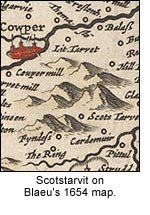Blaeu Atlas of Scotland, 1654
Sir John Scot of Scotstarvit
 John Scot of Scotstarvit in Fife (1585-1670), 'statesman, scholar and
patriot', was born into the nobility, a descendant of the House of Buccleuch,
and held high office as Directory of Chancery, Lord of Session, and
Privy Councillor. His eminence lends credence, if nothing else does,
to the improbable assertion of Bishop Nicolson in 1702, that Timothy
Pont surveyed Scotland with Scot's patronage. The dust jacket of T G
Snoddy's biography of Scot, published in 1968, suggests that Scot saved
Pont's maps from oblivion, also with hindsight an unlikely interpretation
of events. Nevertheless, Scot was extremely influential in the eventual
publication of Pont's maps by Blaeu in 1654.
He also contributed directly to the accompanying text which Blaeu would
have considered an essential part of his atlas, as well as encouraging contributions from Church ministers and Robert Gordon of Straloch.
John Scot of Scotstarvit in Fife (1585-1670), 'statesman, scholar and
patriot', was born into the nobility, a descendant of the House of Buccleuch,
and held high office as Directory of Chancery, Lord of Session, and
Privy Councillor. His eminence lends credence, if nothing else does,
to the improbable assertion of Bishop Nicolson in 1702, that Timothy
Pont surveyed Scotland with Scot's patronage. The dust jacket of T G
Snoddy's biography of Scot, published in 1968, suggests that Scot saved
Pont's maps from oblivion, also with hindsight an unlikely interpretation
of events. Nevertheless, Scot was extremely influential in the eventual
publication of Pont's maps by Blaeu in 1654.
He also contributed directly to the accompanying text which Blaeu would
have considered an essential part of his atlas, as well as encouraging contributions from Church ministers and Robert Gordon of Straloch.
Remarkable correspondence between the Blaeus and Scot, discovered in the National Library of Scotland in 1967, suggests that Scot only became aware of the Pont manuscripts between 1628 and 1631, when they had already been acquired by his fellow Fifer, Sir James Balfour of Denmilne. As a result of Scot's longstanding poetic association with the house of Blaeu, Pont's maps were passed to Amsterdam for engraving, although whether Scot was an intermediary, or whether Balfour passed them directly to Blaeu, is not evident from the correspondence. However, in the introductory matter to the Atlas, Blaeu states that it was Scot who gathered up Pont's papers and sent them to him. Ironically, that led eventually to the loss of many of the best of Pont's original drafts, since not all of those maps which were copied in the first and main phase of engraving were returned to Scotland. However, Scot's action ensured that much of Pont's detailed work on the ground was permanently on record, in printed form.
Scot deserves great credit for advancing the whole atlas project, by the way in which he involved Parliament, the General Assembly and King Charles I. It was on the prompting of Scot that the King wrote to Robert Gordon of Straloch, drawing him and his son into the process of filling the gaps in Blaeu's coverage of Scotland by preparing some new drafts from some of Pont's rougher work. It was Scot who sought to use the powers of the General Assembly to elicit descriptions of parishes across Scotland, which were intended to provide the raw material of Blaeu's accompanying texts. He was, of course, not entirely successful in that respect.
Above all, it was Scot who travelled to Amsterdam, with the formal approval of Parliament, to complete the drafting of text for the Atlas. In his introductory address to the reader, Blaeu enthuses over Sir John's diligence and abilities, saying that he described the shapes of the regions, situation, boundaries, lords - both former and those of modern times - the prosperity of the soil, towns, rivers and all the many other features of this kind. Blaeu could not have praised Sir John more highly, it seems, describing him as a complete Scotland in himself. However, in 1652 Scot was stripped of his official posts and fined £1500 by Cromwell; early editions of the Atlas have some dedicatory credits to Scot removed.
Despite the significance of Scot's final and direct contribution to the publication, his was not the only input to the narrative in the Atlas. The text has hitherto received relatively little attention, compared to the maps in the Atlas. It is probably an amalgam of the writings of Pont himself, Robert Gordon, James Gordon, some Presbyteries and earlier writers, including William Camden. Much work remains to be done, to establish the extent of Scot's contribution to the narrative, but his involvement in the project spanned some 20 years. In Blaeu's stated estimation, he should be engraved in the annals of the Scots!
